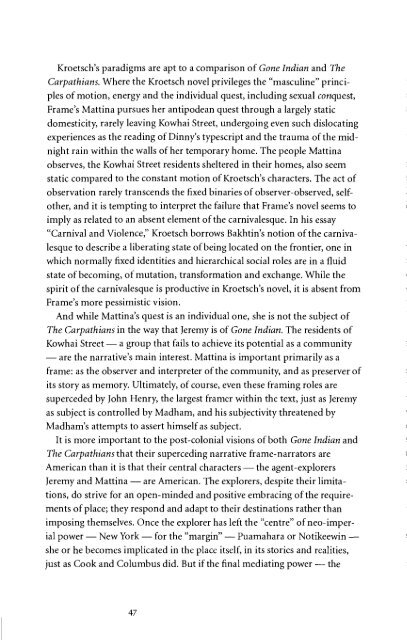The Carpathians - University of British Columbia
The Carpathians - University of British Columbia
The Carpathians - University of British Columbia
Create successful ePaper yourself
Turn your PDF publications into a flip-book with our unique Google optimized e-Paper software.
Kroetsch's paradigms are apt to a comparison <strong>of</strong> Gone Indian and <strong>The</strong><br />
<strong>Carpathians</strong>. Where the Kroetsch novel privileges the "masculine" principles<br />
<strong>of</strong> motion, energy and the individual quest, including sexual conquest,<br />
Frame's Mattina pursues her antipodean quest through a largely static<br />
domesticity, rarely leaving Kowhai Street, undergoing even such dislocating<br />
experiences as the reading <strong>of</strong> Dinny's typescript and the trauma <strong>of</strong> the midnight<br />
rain within the walls <strong>of</strong> her temporary home. <strong>The</strong> people Mattina<br />
observes, the Kowhai Street residents sheltered in their homes, also seem<br />
static compared to the constant motion <strong>of</strong> Kroetsch's characters. <strong>The</strong> act <strong>of</strong><br />
observation rarely transcends the fixed binaries <strong>of</strong> observer-observed, selfother,<br />
and it is tempting to interpret the failure that Frame's novel seems to<br />
imply as related to an absent element <strong>of</strong> the carnivalesque. In his essay<br />
"Carnival and Violence," Kroetsch borrows Bakhtin's notion <strong>of</strong> the carnivalesque<br />
to describe a liberating state <strong>of</strong> being located on the frontier, one in<br />
which normally fixed identities and hierarchical social roles are in a fluid<br />
state <strong>of</strong> becoming, <strong>of</strong> mutation, transformation and exchange. While the<br />
spirit <strong>of</strong> the carnivalesque is productive in Kroetsch's novel, it is absent from<br />
Frame's more pessimistic vision.<br />
And while Mattina's quest is an individual one, she is not the subject <strong>of</strong><br />
<strong>The</strong> <strong>Carpathians</strong> in the way that Jeremy is <strong>of</strong> Gone Indian. <strong>The</strong> residents <strong>of</strong><br />
Kowhai Street — a group that fails to achieve its potential as a community<br />
— are the narrative's main interest. Mattina is important primarily as a<br />
frame: as the observer and interpreter <strong>of</strong> the community, and as preserver <strong>of</strong><br />
its story as memory. Ultimately, <strong>of</strong> course, even these framing roles are<br />
superceded by John Henry, the largest framer within the text, just as Jeremy<br />
as subject is controlled by Madham, and his subjectivity threatened by<br />
Madham's attempts to assert himself as subject.<br />
It is more important to the post-colonial visions <strong>of</strong> both Gone Indian and<br />
<strong>The</strong> <strong>Carpathians</strong> that their superceding narrative frame-narrators are<br />
American than it is that their central characters — the agent-explorers<br />
Jeremy and Mattina — are American. <strong>The</strong> explorers, despite their limitations,<br />
do strive for an open-minded and positive embracing <strong>of</strong> the requirements<br />
<strong>of</strong> place; they respond and adapt to their destinations rather than<br />
imposing themselves. Once the explorer has left the "centre" <strong>of</strong> neo-imperial<br />
power — New York — for the "margin" — Puamahara or Notikeewin —<br />
she or he becomes implicated in the place itself, in its stories and realities,<br />
just as Cook and Columbus did. But if the final mediating power — the

















